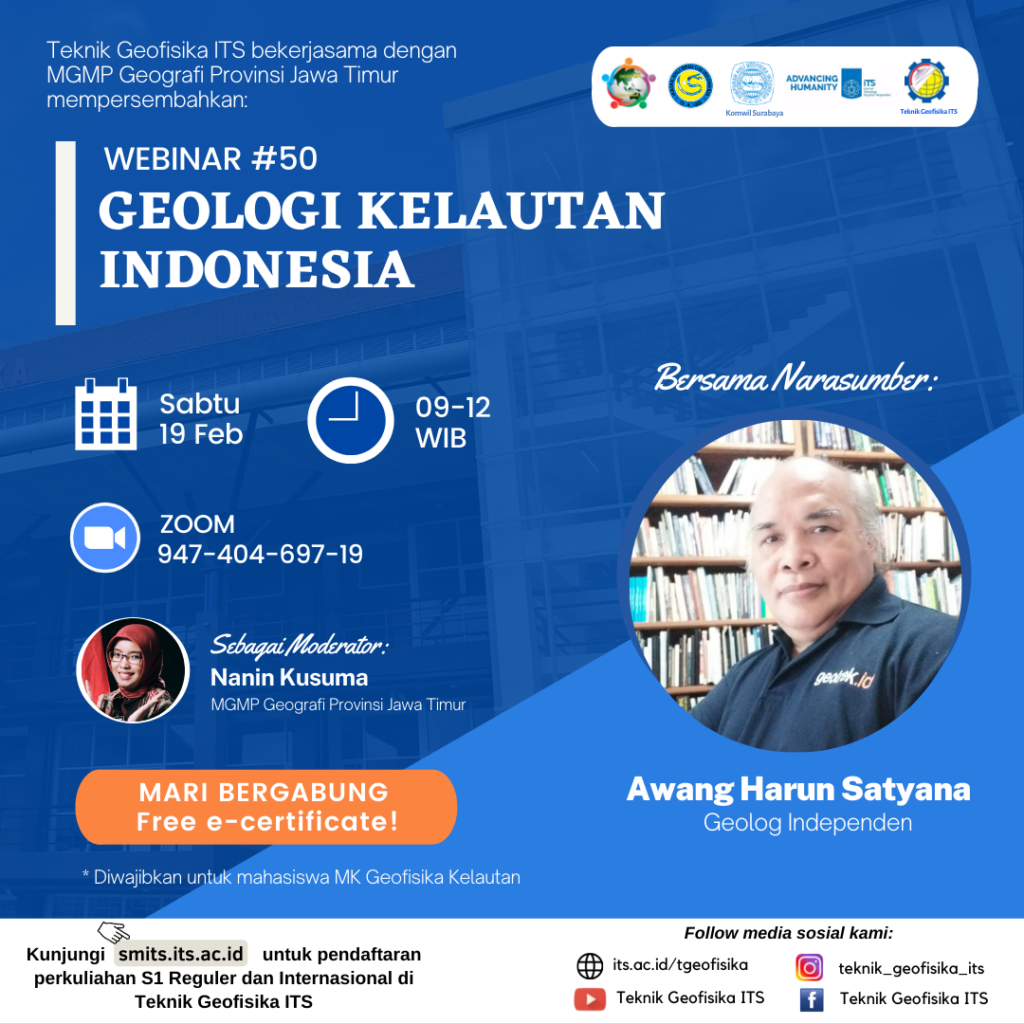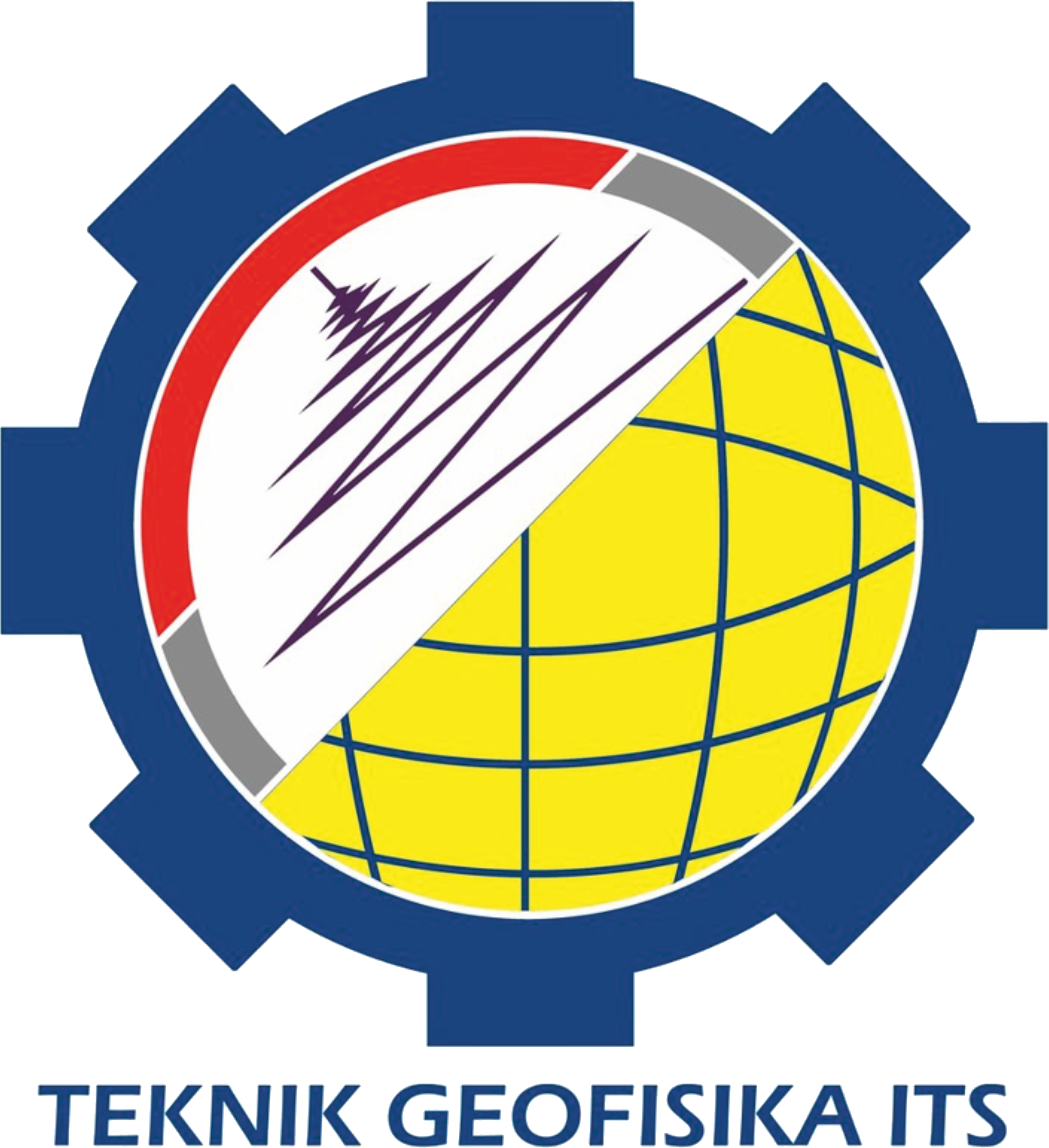Webinar #50: Geologi Kelautan Indonesia
Information
The oceans cover most of the Earth’s surface. Humans have tried to understand the seas and oceans and take advantage of the natural resources that exist in them. In this effort to understand the oceans, special sciences that have been collected in marine science were born, the main sciences of which are: marine chemistry, physical oceanography, marine geology, and marine biology. Studying the oceans, understanding and using them is important for the future of human life and other living things.
Marine geology is the study of geology-related matters beneath the seawater column. Mainly, marine geology studies things about: the tectonic origin and evolution of oceanic and oceanic basins, topographical patterns of the ocean-ocean floor (from estuaries, coasts, shallow seas, continental margins, trenches, deep seas, to mid-oceanic ridges), and sedimentation that occurs from the edge of the continent to the middle of the ocean. Other matters that are also discussed in marine geology are: marine geological research techniques, sea level changes, micropaleontology for paleogeographic reconstruction, geological disasters of underwater origin, and resources from the seabed.
Indonesia because it is an archipelagic region, the sea area exceeds the land area. Due to its complex geological position, Indonesia has unique marine geological characteristics which then influence the unique physical oceanographic characteristics and marine biology. Because of this, the Indonesian marine area has been visited by international research ships from two hundred years ago. The Indonesian government has been gradually carrying out marine scientific research since 1960 with its research vessels. Now with his own ability and international cooperation for both scientific purposes and resource exploration, knowledge of Indonesian marine geology is getting better.
This webinar “Indonesian Marine Geology” will present stories about marine geology in general and the case in Indonesia, its future, and its challenges.
We, ITS Geophysical Engineering Department, MGMP Provinsi Jawa Timur, HAGI and IAGI collaborate to organize:
WEBINAR: GEOLOGI KELAUTAN INDONESIA
- Day/Date : Saturday/19 Feb 2022
- Hours : 09.00 – 12.00
- Narsum : Awang Harun Satyana (Independent Geologist)
- ZOOM link : its.id/GeoLectures (9474-0469-719)
Once the event is finished, the presentation can be accessed through this link:
-
Geologi Kelautan Indonesia
- Map of Batimetri: http://batnas.big.go.id/
- Vulnerable to Landlisde Map: https://www.esdm.go.id/assets/media/content/content-atlas-sebaran-tanah-lunak.pdf
- Liquifaction Map: https://www.esdm.go.id/assets/media/content/content-atlas-zona-likuefaksi-indonesia.pdf
- Maps of Published by ESDM: https://onemap.esdm.go.id/download.html
- Sea Resources Video in Flores and Papua: https://www.youtube.com/watch?v=bghZ2KHMjGI

Latest News
-
Pertajam Keilmuan Petrofisikamu dengan Studi Kasus Di Dunia Oil and Gas, dalam PETROPHYSICS TRAINING 2025!
Teknik Geofisika ITS mengajak anda untuk mendalami pengetahuan dan masalah-masalah yang terjadi seputar Petrofisika dalam acara PETROPHYSICS TRAINING 2025.
-
Kuliah Tamu “Bahaya Geologi Penurunan Tanah Daerah Pesisir Pantai Utara Jawa”
Teknik Geofisika ITS menyelenggarakan Kuliah Tamu “Bahaya Geologi Penurunan Tanah Daerah Pesisir Pantai Utara Jawa” dengan mengundang narasumber dari
-
WEBINAR “CERITA SUKSES UGG KEBUMEN & UGG MERATUS”
Teknik Geofisika ITS dan Ikatan Ahli Geologi Indonesia (IAGI) menyelenggarakan webinar “Cerita Sukses UGG Kebumen dan UGG Meratus”, mengundang





